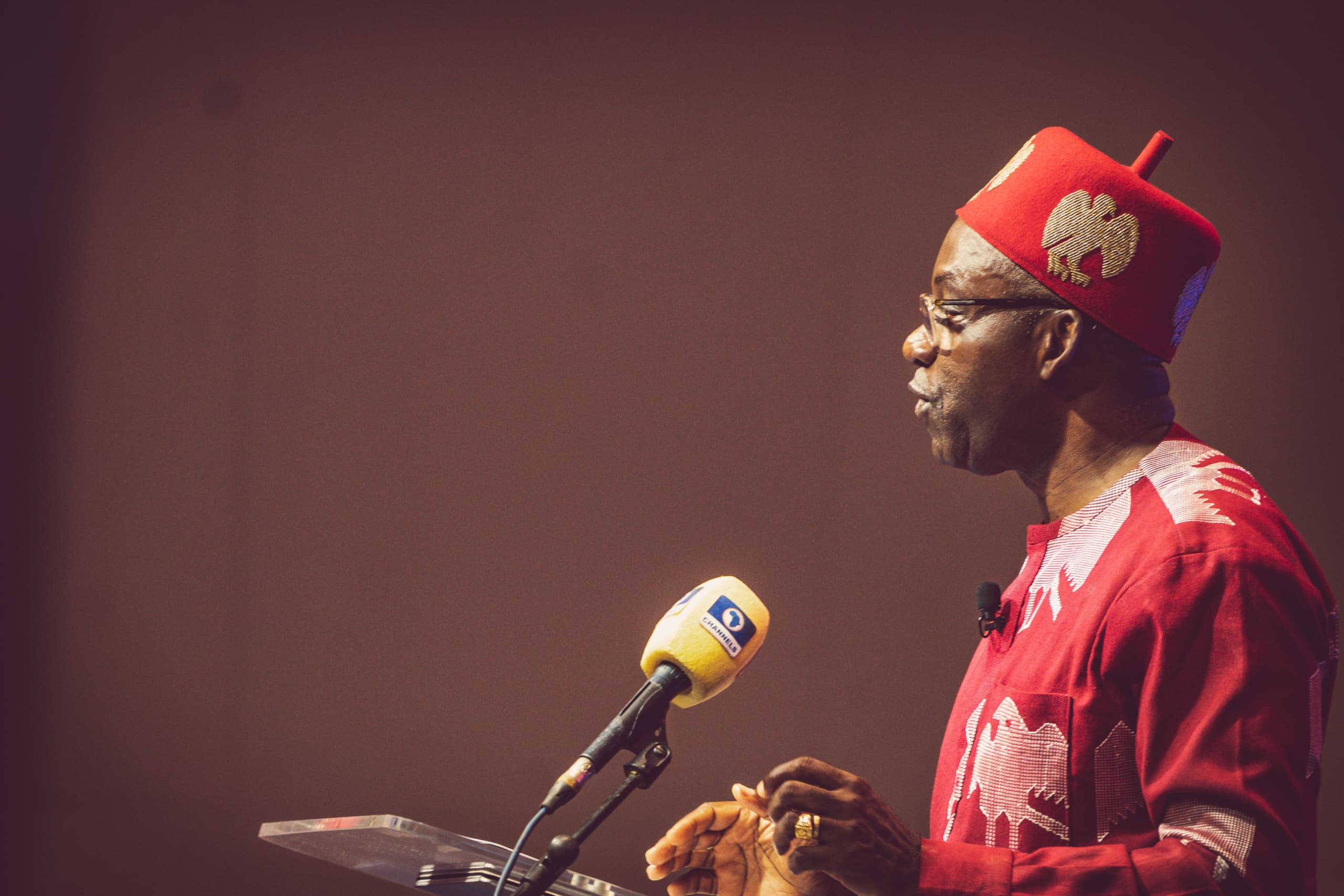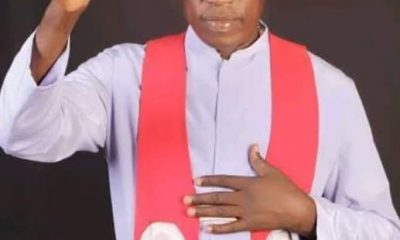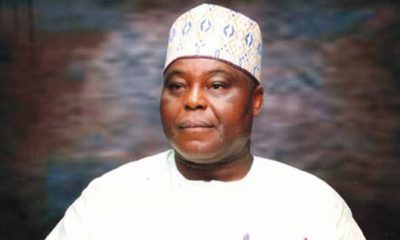News
Soludo: A Pragmatic Economist and Statesman for Nigeria’s Future

By Christian ABURIME
In a riveting address delivered at The Platform, a special national policy dialogue celebrating Nigerian democracy on June 12 in Lagos, Anambra State Governor, Professor Chukwuma Charles Soludo, CFR, perceptively dissected national issues and articulated a compelling vision for Nigeria’s economic and political future. Invited as one of the guest speakers, Governor Soludo did not just show up as a governor, but as an erudite public intellectual and hands-on leader, as he displayed the rare combination of brilliant economic insights and statesmanlike vision that Nigeria desperately needs.
His speech on the subject of Sustainable Democracy and Free Market Economy touched base with the contemporary challenging times, highlighting his profound understanding of Nigeria’s economic challenges and presenting a roadmap for national recovery. With a depth of knowledge honed over decades as an academic, international consultant and former Central Bank governor, Prof. Soludo diagnosed the deep-rooted ills afflicting Nigeria’s battered economy with clinical precision.
He exposed the structural flaws, policy inconsistencies, and lack of productivity that have turned a potentially prosperous nation into a staggering giant struggling under a mountain of debt. In the end, he also propounded solutions in such a way that any dispassionate listener would come away with a genuine impression that Governor Soludo’s comprehensive diagnostic approach and exemplary leadership qualities underscore his potential as the pragmatic, paradigm-shifting leader Nigeria needs in the near future.
Prof. Soludo, with his illustrious academic background and distinguished career, has always been an icon of intellectual rigour and policy innovation. His tenure as the Governor of the Central Bank of Nigeria is still remembered for the significant reforms that stabilised the banking sector. Soludo’s deep-seated knowledge of economic principles and his pragmatic approach to policy-making were evident in his Platform speech. Some of his remarks are as profound as they are reflective of the man’s depth of mind. A few quotes from his speech will suffice.
On the dynamics of democracy and free market economy, Soludo said “It needs to be emphasized however that democracy and market economy are dynamic and permanent work-in-progress, requiring constant contestations among interest groups in the struggle towards a more perfect society.” He continued, “The state of the economy is therefore the determinant of enduring democracy, and for most people, democracy is a key pre-requisite for sustainable economic transformation. Democracy and, indeed, any form of governance must deliver tangible social and economic benefits to the generality of the citizens to be credible and sustainable.”
On admitting the reality of Nigeria’s true economic condition, Prof. Soludo was downright frank: “Let’s admit a fact which most Nigerians don’t seem to appreciate. Nigeria is a very poor country, and its public finance is broken. This admission is critical to any reasonable discourse on the road ahead.” To fix the broken public finance, Soludo implied thus: “Given the humongous infrastructure deficit, the consolidated public sector (FGN and States) capital spending should be at least 10-15% of GDP per annum. Currently, it is less than 5%. Indeed, the entire budget of the FGN is probably less than 30% of what we need to be investing in infrastructure per annum.”
On economic solutions, Soludo went further to emphasize thus: “There is an emergency, and incremental changes won’t cut it. Intentional systemic disruptions are urgently needed but it requires mass mobilization and ownership by the public. Suffice it to say that fixing the systemic insecurity, broken public finance and economy, broken oil and gas sector, infrastructure and environmental decay, rising social tensions, and restoring hope and confidence of the citizens would require us to try several roads not travelled – thinking and acting without any box!”
But how does Soludo see the efforts of the current president in tackling the volatile economy? Hear him: “I believe that President Tinubu (the man who fought the FGN to a standstill over the power of Lagos State to design the local government system of its choice, championed the fundamentals of true federalism 2003-2007, and tamed the Atlantic Ocean) has the knowledge and courage to mobilize Nigeria to cross over the current crossroads. There are no easy or quick fixes, and he needs our collective support.”
Reflecting his own empathetic nature, sensitivity and emotional intelligence as a leader, Soludo expressed a most touching thought on the current hard times most Nigerians are facing: “As a person, I deeply feel the pains of all Nigerians at these challenging times, especially the over 100 million Nigerians who are multi-dimensionally poor. Times are hard. Sometimes I wish that I can give every resident of my state N1 million each to cushion the effects of the hard times.”
But the professor of economics is more than just an economic theorist – he is a leader taking bold actions to put his ideas into practice in Anambra State. Since assuming office over two years ago, he has led by example through prudent spending, patronising made-in-Nigeria products, and displaying genuine empathy for the common man. His commitment to social justice is a cornerstone of his governance philosophy, making him a leader who truly understands and addresses the needs of his people.
According to Soludo, addressing the needs of common Nigerians “will require a fundamental reordering of national priorities to invest massively in social programs (especially health, education and social protections) as well as infrastructure to give everyone a stake in the national cake, thereby securing the future. I am an Awoist and a true progressive on this front.” In fact, Soludo’s Awoist priorities are re-establishing social services in education where he has employed thousands of quality teachers and abolished tuition fees; in healthcare where more personnel are being employed and pregnant women enjoy free antenatal care; in economic security for the senior citizens and underprivileged; and in infrastructural development – all without resorting to piling on more debt.
Nigeria’s economic malaise is quite convoluted and Governor Soludo’s analysis of the woes was extraordinarily incisive. Over and over, he identified structural deficiencies, rampant corruption, and over-reliance on oil revenues as key impediments to economic stability. His critique was not just a lamentation of Nigeria’s economic troubles but a call to action. Soludo emphasized the need for economic diversification, robust governance frameworks, and an enabling environment for entrepreneurship and innovation. His insights reflect a deep understanding of the interconnectedness of economic policies and social outcomes, and the impact on our democracy.
Again, in an era where public trust in leadership is waning, Governor Soludo exemplifies integrity and accountability. His prudent fiscal management in Anambra State offers an exemplary model in transparency and efficiency. By prioritizing locally-made products, Soludo not only supports Nigerian industries but also fosters a sense of national pride and self-reliance. His administration’s fiscal discipline, avoiding excessive borrowing, demonstrates a responsible approach to governance that prioritizes long-term stability over short-term gains. Little wonder, Anambra State under his leadership has been rated one of the top 5 fiscally sustainable states in Nigeria, according to BudgIT.
One of the defining characteristics of Governor Soludo is his unwavering political will to implement bold reforms. His tenure so far as Anambra State’s governor is marked by decisive actions that, while sometimes unpopular, are necessary for sustainable progress. At the risk of repetition, Soludo’s stance against needless borrowing to fund government activities is a courageous deviation from the norm, reflecting his long-term vision for financial independence and economic sovereignty. His leadership style is characterised by a fearless pursuit of policies that ensure a resilient and self-sufficient economy.
As Nigeria grapples with multifaceted challenges, the need for future perceptive leaders and profound thinkers like Professor Charles Soludo has never been more apparent. His blend of academic excellence, practical governance experience, and compassionate leadership positions him uniquely as a statesman capable of steering Nigeria towards a prosperous future. Soludo’s vision for a sustainable democracy and a thriving free market economy offers a blueprint for national recovery and growth. His emphasis on prudent spending, local patronage, social security, ethical reset and fiscal responsibility encapsulates the principles of good governance.
Of course, Nigeria has no shortage of brilliant thinkers and economists diagnosing its woes. But the nation is desperately short on statesmen willing to walk the difficult path of reform and restructuring rather than taking the easy road of corruption and deficits. In Governor Soludo, Nigeria may have found a future leader with both extraordinary intellect and the fortitude to transform his ideas into reality through hard work and political vision.
At times of low morale when citizens need inspiration, Soludo also shows that he is a leader who doesn’t give up. Hear him: “I am an incredible optimist in the potential greatness of this blessed country. That’s essentially why I have persisted in public service and applied for my current job. I believe in the infinite possibilities and opportunities that Nigeria presents. Our youthful population, if unleashed, will definitely conquer the world and the 22nd Century will be Nigeria’s century.”
As Nigeria looks to the future, it should hold up Governor Soludo as a model for the type of transformative yet principled leadership it needs to achieve sustainable democracy wedded to free market prosperity. An accomplished scholar and public servant, Soludo represents hope that Nigeria can rise to its full economic potential by finally having a combination of a brilliant economic diagnosis, empathetic leadership, self-sacrificing prudence, boldness of action and the pragmatic prescription to cure what ails it.
Christian Aburime is the Press Secretary to Governor Soludo.
News
INEC rejects petition to recall Natasha

A petition to recall the Senator representing Kogi Central District, Natasha Ajpoti-Uduagban, has been rejected by the Independent National Electoral Commission, INEC.
The Commission in a statement on Thursday said that the petition did not meet the requirements for recalling a senator of the Federal Republic of Nigeria.
The Commission recently formally received a petition from constituents of Senator Natasha Akpoti-Uduaghan, calling for the commencement of her recall process.
The Secretary to the Commission, Rose Oriaran-Anthony, received the petition which was submitted at INEC’s headquarters in Abuja on Monday.
Natasha, who represents Kogi central in the Senate, is currently on suspension for allegedly flouting the Senate rules.
According to the petitioners, over 250,000 constituents’ signed the petition, out of about 480,000 registered voters in the senatorial district.
The petition was titled _Constituents’ Petition for the Recall of Senator Natasha Akpoti-Uduaghan on Grounds of Loss of Confidence’.
In a brief statement on Thursday, the Commission said, “The petition for the recall of the Senato representing the Kogi Central Senatorial District has not met the requirement of Section 69(a) of the Constitution of the Federal Republic of
Nigeria 1999 (as amended).”
Details later….
News
Six simple steps to avoid stroke

According to health experts, these are some steps you can take to reduce the risk of having stroke
1. Avoid smoking
Experts say the most important thing to do to improve brain health is to quit smoking cigarettes and vapes.
Apart from accelerating brain aging and increasing the risk for dementia, smoking causes damage to blood vessel walls in the brain and reduces overall oxygen levels due to the carbon monoxide in tobacco – making the body more prone to having a stroke.
2. Reduce blood sugar levels
High blood sugar (hyperglycemia) is a significant risk factor for stroke as it can damage blood vessels, which can lead to blood clots that travel to the brain.
Over time, excessive blood glucose can result in increased fatty deposits or clots in blood vessels. These clots can narrow or block blood vessels in the brain.
3. Maintain a healthy weight and diet
Being overweight and eating unbalanced meals can significantly amplify risks for having a stroke. Carrying too much weight increases your risk of high blood pressure, heart disease, high cholesterol and Type 2 diabetes – all of which can damage blood cells, impact oxygen levels and contribute to higher stroke risk.
4. Regular Exercise
You need regular exercise to stay healthy and avoid stroke. Exercise should be spread evenly over four to five days a week, or every day. Do strengthening activities, usually more than two days per week.
5. Get Enough Sleep
While not a direct cause, poor sleep and sleep disorders, especially sleep apnea, are linked to an increased risk of stroke, potentially due to inflammation, reduced oxygen levels and blood flow to the brain.
The risk of stroke symptoms is four times greater among individuals who slept fewer than six hours a night compared to individuals who reported seven to eight hours of sleep a night.
However, experts also warn that ‘Too much sleep is also associated with increased stroke risk, so try to stay as active as possible so you can sleep as well as possible.’
6. Regular Checkup
You are expected to go for overall medical checkup regularly to ensure really detection and treatment of I’ll health.
News
Netanyahu ignores ICC warrant, arrives in Hungary

Benjamin Netanyahu, the Israeli Prime Minister, arrived in Budapest early morning on Thursday, marking his first visit to Europe since 2023, despite an International Criminal Court (ICC) arrest warrant against him.
Hungarian Prime Minister Viktor Orban invited Netanyahu last November, promising Hungary would not enforce the ICC arrest warrant, which he called politically motivated.
The ICC issued arrest warrants for Netanyahu and former Defense Minister Yoav Gallant, accusing them of crimes against humanity and war crimes, including using starvation as a weapon towards Palestinians in Israel’s war against Hamas in Gaza.
Hamas is recognized as a terrorist organization by the US, the EU, and Israel, among others.
Hungary’s Defense Minister Kristof Szalay-Bobrovniczky received Netanyahu at the airport with military honours.
Orban is expected to back Netanyahu on US President Donald Trump’s plan to relocate Palestinians from Gaza. That plan has been criticized by UN experts as ethnic cleansing.
Experts say Netanyahu is strategically visiting countries where he faces no risk of arrest, aiming to gradually normalize his international travel.
In February, Germany’s chancellor-in-waiting Friedrich Merz said he will find “ways and means” for Netanyahu to visit Germany.
-

 News2 years ago
News2 years agoBreaking: Tinubu’s authentic ministerial nominees
-

 News2 years ago
News2 years ago“Anytime we want to kill terrorists, President would ask us to take permission from France but they were killing our soldiers-” Niger Republic coup leader
-

 News1 year ago
News1 year ago“I’m leaving the Catholic church because Bishop Onah is oppressing me,” says Okunerere
-

 News2 years ago
News2 years agoDokpesi and the Gazebo Mystique
-

 News2 years ago
News2 years agoRadio Nigeria’s veteran broadcaster Kelvin Ugwu dies three months after retirement from service
-

 News11 months ago
News11 months agoPersons against Allagoa’s reforms behind protests at NSITF
-

 News2 years ago
News2 years agoTsunami: Tinubu orders dissolution of managements, boards of MDAs, to sack all Buhari’s political appointees
-

 News2 years ago
News2 years agoLast minutes fever: Nigerian Hunters Service optimistic as Buhari signs five Bills into law

